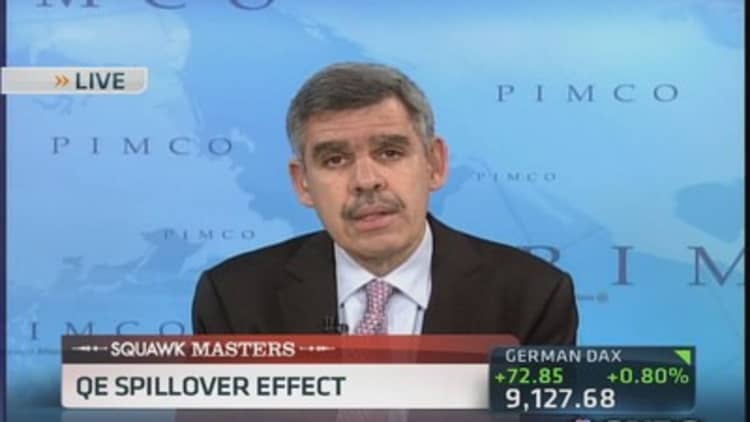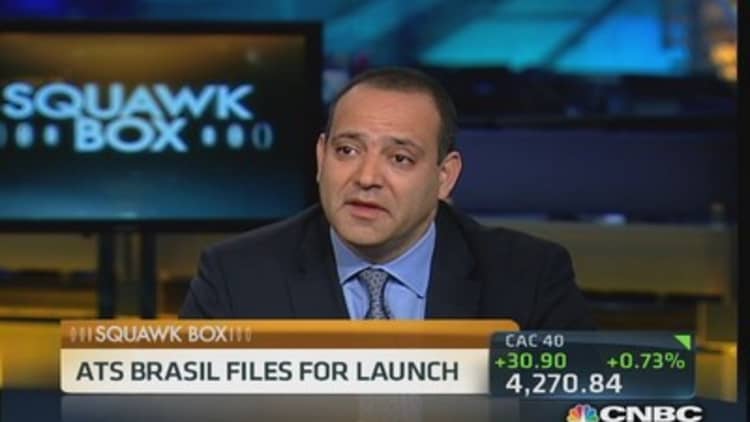A tongue-in-cheek "Brazilian 2014 Calendar" making the rounds on Facebook jokes that, because of the soccer World Cup, an unusually late Carnival, other holidays and a presidential election, real work will only be possible during three months next year.
But some people aren't laughing.
The unusual schedule could in fact cause significant damage to productivity and be a further drag on an economy that has already been spinning its wheels, some business leaders and economists say.
(Read more: Brazil fan violence raises World Cup worries)
"I've heard many people say that 2014 will be a lost year. That's absurd, but if people believe it, I guess it will be true," said Paulo Motta, head of a retailers' union in the northeastern state of Bahia.
In a worst-case scenario, the "calendar effect" could shave as much as 0.3 percentage points off Brazil's gross domestic product next year, said Andre Perfeito, an economist at Gradual Investimentos in Sao Paulo.

Other economists consulted by Reuters said they thought any damage would be much smaller, while some said the effect was just too difficult to forecast.
What's clear is that, with Brazil's economy forecast to grow just 2.3 percent this year, and barely 2 percent in 2014, even a small hit to output is bad news.
The problems start early.
Traditionally, the Brazilian summer vacation season stretches from Christmas into January and beyond. While some work gets done, meetings are difficult to schedule and many Brazilians say, only half-jokingly, that the business year doesn't start in earnest until Carnival ends.
This year, Carnival ended on February 12. But in 2014, because of the lunar calendar that dictates the pre-Lenten festival's timing, its last day will be March 4. That means many Brazilians will extend their vacations, or at least keep "summer hours" for an extra few weeks.
(Read more: Where now for Brazil after rates hiked for fifth month?)
Beware the world cup - whether Brazil wins, or loses
The World Cup, which Brazil will host for a month starting on June 12, could pose an even greater distraction.
When Brazil's team plays, offices and factories around the country traditionally shut down so employees can watch on TV.

But those won't be the only lost hours this year. A law passed last year gives the 12 cities hosting World Cup matches, and the states where they are located, the right to declare special holidays on game days. That's largely to ensure that visiting teams and their fans won't have to deal with usual workday traffic gridlock on their way to stadiums.
Most cities and states have not yet confirmed whether they will go ahead with the holidays. But in Sao Paulo alone, it could mean six additional days off - all of which, by coincidence, would fall on weekdays.
Brazil's biggest stock exchange operator, BM&FBovespa, has said its trading calendar could be affected if the holidays are declared.
Meanwhile, the thrill of hosting the World Cup for the first time since 1950, and rooting for Brazil to win a record sixth championship, means that even when people do show up for work, many will be furtively live-streaming games on their computers or phones.
A study of about 20 leading Brazilian corporations this year by Fundação Dom Cabral, a business school, found that all of them plan to defer business travel during the Cup because of possible airport chaos and other distractions.
(Read more: Forget bank runs, credit crazy Brazil is heading for trouble)
Indeed, many people admit they'll find it hard to concentrate on anything else until the tournament ends on July 13. The humorous calendar circulating on social media shows all of May blacked out as "Preparation for the World Cup." June is simply "World Cup," while July is entirely dedicated to "Celebration or Mourning" of the tournament's result.
Some retailers are begging to work
That's obviously an exaggeration - many Brazilians don't even like soccer, and those that do will still have performance goals to meet, shelves to stock or clients to keep happy.
Meanwhile, some business groups are pressuring city governments to reduce the number of holidays, or perhaps just limit them to students, so as not to hurt their profits.
Motta, the retailers' union chief, said his members lost 40 percent of their usual sales when the city government of Salvador declared holidays during the Confederations Cup - a kind of warm-up event for the World Cup in June 2013.
"We can't afford that again," he said.
David Beker, chief economist for Brazil at BofA Merrill Lynch, said some manufacturers may accelerate production early in the year to help offset the expected World Cup lull.
A last-minute rush of construction on Cup-related infrastructure could end up boosting the economy, although economists expect it to fall well short of the building bonanza the government was touting just a few years ago.
Spending by as many as 600,000 foreign tourists expected to visit will also help offset lost productivity.
Beker acknowledged that the confluence of events was making economic forecasts "extremely complicated" for Brazil next year.
The other big disruptive event will be the presidential election on October 5, in which Rousseff is expected to run for a second term. If no candidate gets more than 50 percent of the vote, there will be a runoff on October 26.
(Read more: Beer to get World Cup boost worth millions)
Even though none of the opposition candidates are advocating a major shift from Rousseff's left-leaning policies, some executives still say they're likely to be more cautious about investments until the election is over.
All told, in terms of distractions, "it's like we're having three carnivals this year," one local economist said.
The calendar on Facebook went even further than that. After accounting for the elections, the World Cup and Carnival, plus holidays in April and December, it listed the only "working months" in Brazil in 2014 as August, September and November.

